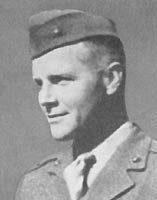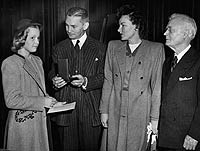Return to Naval History and Heritage Command home page.  Return to Online
Library Listing
Return to Online
Library Listing

DEPARTMENT OF THE NAVY -- NAVAL HISTORY AND HERITAGE COMMAND
805 KIDDER BREESE SE -- WASHINGTON NAVY YARD
WASHINGTON DC 20374-5060

Online Library of Selected Images:
-- PEOPLE -- UNITED STATES --
First Lieutenant Alexander Bonnyman, Jr., USMCR, (1910-1943)
Alexander Bonnyman, Jr. was born on 2 May 1910 in Atlanta,
Georgia. He attended Princeton University, briefly served as a
U.S. Army Air Corps flying cadet in 1932, and worked in the coal-mine
industry during the following decade. In June 1942 Bonnyman enlisted
in the U.S. Marine Corps from the state of New Mexico, completing
basic training at the Marine Corps Recruit Depot, San Diego, California.
He was then assigned to the Sixth Marines, Second Division and
served with distinction in the Guadalcanal
Campaign's last weeks. His performance at that time led to
a battlefield commission, receiving promotion in February 1943
to Second Lieutenant. Six months later he attained the rank of
First Lieutenant.
During 20-22 November 1943, Bonnyman served as the Executive
Officer of the Second Battalion Shore Party, Eighth Marines, Second
Marine Division during the amphibious assault on Betio Island,
part of Tarawa Atoll in the Gilbert Islands. For three consecutive
days of the bloodiest fighting yet seen in the Pacific war, he
bravely led his men in attacks on fiercely-defended Japanese fortifications.
First Lieutenant Bonnyman was mortally wounded in an enemy counterattack
near the end of the battle. For his "conspicuous gallantry
and intrepidity" at Tarawa, he was posthumously awarded the
Medal of Honor. Alexander
Bonnyman, Jr. is listed on the "In
Memory" marker at Santa Fe National Cemetery, Santa Fe, New
Mexico and on the Wall of the Missing at National Memorial Cemetery
of the Pacific, Honolulu, Hawaii.
USNS 1st LT Alex Bonnyman (T-AK-3003), 1985-____, is
named in honor of First Lieutenant Alexander Bonnyman, Jr.
This page features the only images we have concerning Alexander
Bonnyman, Jr.
Click on the small photograph to prompt
a larger view of the same image.
Photo #: NH 105673
First Lieutenant Alexander Bonnyman, Jr., USMCR
Halftone reproduction of a photograph, copied from the official
publication "Medal of Honor, 1861-1949, The Navy",
page 159.
Alexander Bonnyman Jr. was posthumously awarded the Medal of
Honor for "conspicuous gallantry and intrepidity" from
20-22 November 1943 while serving as Executive Officer of Second
Battalion Shore Party, Eighth Marines, Second Division during
the Battle of Tarawa, Gilbert Islands. He bravely led his men
during three days of intense fighting on Betio Island before
being mortally wounded by the enemy.
U.S. Naval History and Heritage Command Photograph.
Online Image: 44KB; 580 x 765 pixels |
 |
Photo #: NH 105691
Secretary of the Navy James Forrestal
Presents twelve-year old Miss Frances Berry Bonnyman the Medal
of Honor posthumously awarded to her father, First Lieutenant
Alexander Bonnyman, Jr., USMCR, in a ceremony at the Navy Department,
22 January 1947.
First Lieutenant Bonnyman served as Executive Officer of the
Second Battalion Shore Party, Eighth Marines during the Battle
of Tarawa, Gilbert Islands, 20-22 November 1943. He bravely led
his men for three days during the assault on the heavily defended
Japanese position on Tarawa's Betio Island before being mortally
wounded by the enemy.
Official U.S. Navy Photograph, from the "All Hands"
collection at the Naval History and Heritage Command.
Online Image: 85KB; 740 x 585 pixels |
 |
Medal of Honor citation of First Lieutenant Alexander Bonnyman
Jr., USMC (as printed in the official publication "Medal
of Honor, 1861-1949, The Navy", page 159):
"For conspicuous gallantry and intrepidity at the risk
of his life above and beyond the call of duty as Executive Officer
of the Second Battalion Shore Party, Eighth Marines, SECOND Marine
Division, during the assault against enemy Japanese-held Tarawa
in the Gilbert Islands, 20-22 November 1943. Acting on his own
initiative when assault troops were pinned down at the far end
of Betio Pier by the overwhelming fire of the Japanese shore
batteries, First Lieutenant Bonnyman repeatedly defied the blasting
fury of the enemy bombardment to organize and lead the besieged
men over the long, open pier to the beach and then, voluntarily
obtaining flame throwers and demolitions, organized his pioneer
shore party into assault demolitionists and directed the blowing
of several hostile installations before the close of D-Day. Determined
to effect an opening in the enemy's strongly organized defense
line the following day, he voluntarily crawled approximately
40 yards forward of our lines and placed demolitions in the entrance
of a large Japanese emplacement as the initial move in his planned
attack against the heavily garrisoned, bombproof installation
which was stubbornly resisting despite the destruction early
in the action of a large number of Japanese who had been inflicting
heavy casualities on our forces and holding up our advance. Withdrawing
only to replenish his ammunition, he led his men in a renewed
assault, fearlessly exposing himself to the merciless slash of
hostile fire as he stormed the formidable bastion, directed the
placement of demolition charges in both entrances and seized
the top of the bombproof position, flushing more than 100 of
the enemy who were instantly cut down, and effecting the annihilation
of approximately 150 troops inside the emplacement. Assailed
by additional Japanese after he had gained his objective, he
made a heroic stand on the edge of the structure, defending his
strategic position with indomitable determination in the face
of the desperate charge and killing three of the enemy before
he fell, mortally wounded. By his dauntless fighting spirit,
unrelenting aggressiveness and forceful leadership throughout
3 days of unremitting, violent battle, First Lieutenant Bonnyman
had inspired his men to heroic effort, enabling them to beat
off the counterattack and break the back of hostile resistance
in that sector for an immediate gain of 400 yards with no further
casualities to our forces in this zone. He gallantly gave his
life for his country." |
NOTES:
To the best of our knowledge, the pictures referenced here
are all in the Public Domain, and can therefore be freely downloaded
and used for any purpose.
Some images linked from this page bear obsolete credit lines
citing the organization name: "Naval Historical Center".
Effective 1 December 2008 the name should be cited as: "Naval
History and Heritage Command".
 Return to Naval History and Heritage Command home page. Return to Naval History and Heritage Command home page.
Page made 17 April 2008
Introductory text corrected 5 April 2009
|
